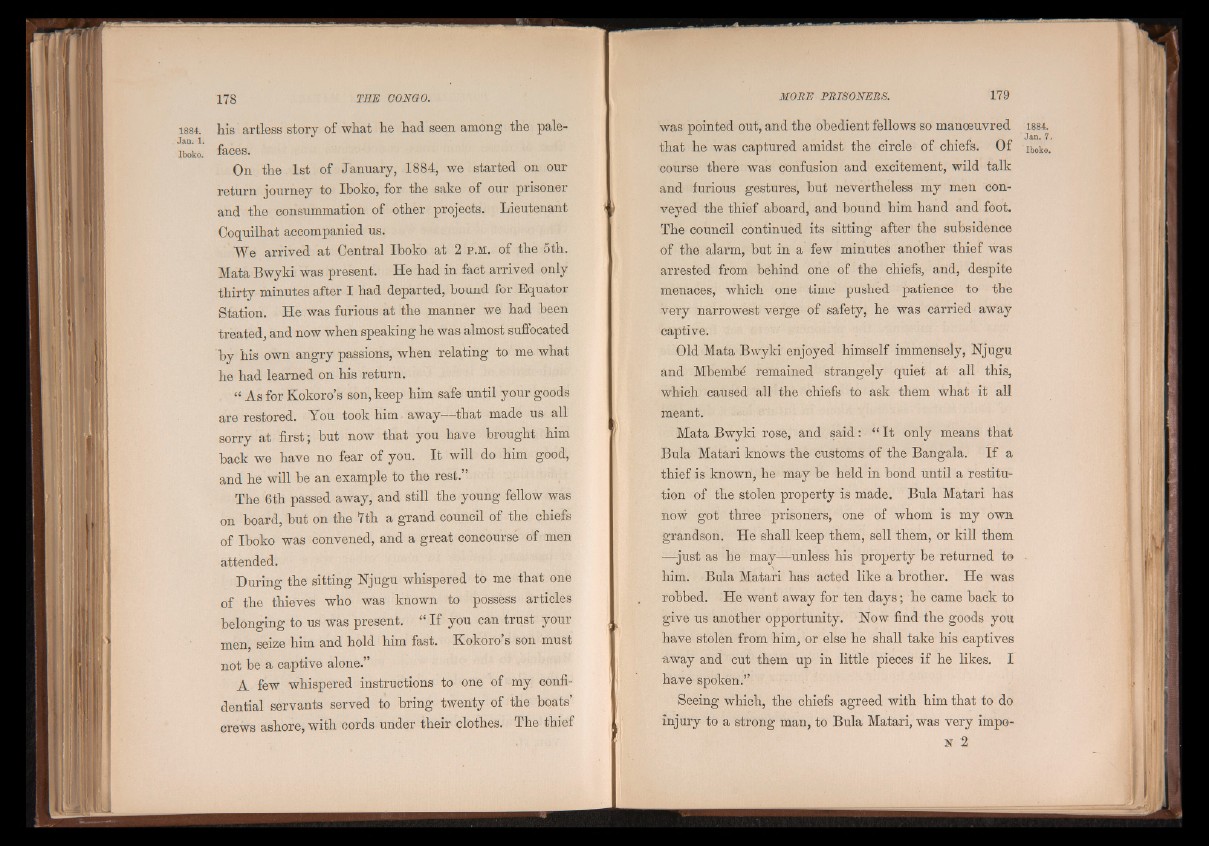
Iboko.
Ms artless story of what he had seen among the palefaces.
On the 1st of January, 1884, we started on our
return journey to Iboko, for the sake of our prisoner
and the consummation of other projects. Lieutenant
Coquilhat accompanied us.
We arrived at Central Iboko at 2 p .m . of the 5th.
Mata Bwyki was present. He had in fact arrived only
thirty minutes after I had departed, bound for Equator
Station. He was furious at the manner we had been
treated, and now when speaking he was almost suffocated
by his own angry passions, when relating to me what
he had learned on Ms return.
“ As for Kokoro’s son, keep him safe until your goods
are restored. "You took him • away that made us all
sorry at first ; but now that you have brought him
back we have no fear of you. I t will do him good,
and he will be an example to the rest.”
The 6th passed away, and still the young fellow was
on board, but on the 7th a grand council of the chiefs
of Iboko was convened, and a great concourse of men
attended.
During the sitting Njugu whispered to me that one
of the thieves who was known to possess articles
belonging to us was present. “ I f you can trust your
men, seize him and hold him fast. Kokoro’s son must
not be a captive alone.”
A few whispered instructions to one of my confidential
servants served to bring twenty of the boats’
crews ashore, with cords under their clothes. The thief
was pointed out, and the obedient fellows so manoeuvred
that he was captured amidst the circle of chiefs. Of
course there was confusion and excitement, wild talk
and furious gestures, but nevertheless my men conveyed
the thief aboard, and bound him hand and foot.
The council continued its sitting after the subsidence
of the alarm, but in a few minutes another thief was
arrested from behind one of the chiefs, and, despite
menaces, which one time pushed patience to the
very narrowest verge of safety, he was carried away
captive.
Old Mata Bwyki enjoyed himself immensely, Njugu
and Mbembe remained strangely quiet at all this,
which caused all the chiefs to ask them what it all
meant.
Mata Bwyki rose, and said: “ I t only means that
Bula Matari knows the customs of the Bangala. If a
thief is known, he may be held in bond until a restitution
of the stolen property is made. Bula Matari has
now got three prisoners, one of whom is my own
grandson. He shall keep them, sell them, or kill them
—just as he may—unless his property be returned to
him. Bula Matari has acted like a brother. He was
robbed. He went away for ten days; he came back to
give us another opportunity. Now find the goods you
have stolen from him, or else he shall take his captives
away and cut them up in little pieces if he likes. I
have spoken.”
Seeing which, the chiefs agreed with him that to do
Injury to a strong man, to Bula Matari, was very impo-
N 2
1884.
Jan. 7.
Iboko.